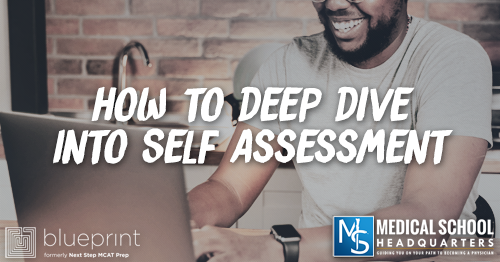Apple Podcasts | Google Podcasts
Session 296
We cover how to handle not getting the score you wanted in the Bio/Biochem section of the MCAT. We’re joined by Dorothy from Blueprint MCAT. If you would like to follow along on YouTube, go to premed.tv.
Listen to this podcast episode with the player above, or keep reading for the highlights and takeaway points.
[02:39] Timing for the Bio/Biochem Section
The bio/biochem section is very experiment-heavy. There are a lot of primary research passages and some things you’ve seen in passing before or maybe been exposed to before. But it is its own experiment. They have a hypothesis, they have methods, and they have results.
“The primary research passages alone can be challenging because they test on things that maybe you haven't seen explicitly in your classes or in your modules.”Click To TweetThere are 59 questions in the section and you have 95 minutes to answer the entire section. Then there are 15 discrete questions interspersed between four sets of passages. The passages are where time management becomes hard. Especially if you are seeing a difficult passage with a lot of experiments, figures, or experimental models that you’ve never seen before.
Timing can be hard, especially when you get stuck with a harder passage near the beginning of your section. Dorothy recommends spending 40 seconds to a minute per discrete question and then eight minutes per passage between 10 passages.
With CARS, Dorothy recommends splitting your time really evenly between your passage and your reading. That’s because you want a solid understanding of the passage before you dive into questions. With sciences, especially biochem, it’s okay to spend less time reading, especially in primary research passages.
Dorothy recommends breaking down the passage into these big components such as background, hypothesis, methods, and results. Then use those as you go into the questions. Spend two to three minutes reading the passage. Then spend the rest of the five to six minutes on the questions.
[07:03] Self-Study vs. Formal Class
Dorothy explains that self-study requires some level of motivation. If you are really motivated to learn it this time around, Dorothy thinks self-studying is appropriate. Additionally, Biochem is one of the medical school prereqs for most medical schools. And so you’ll have to take it eventually.
If you have the time and the wiggle room to reschedule your MCAT to a later time after you’ve taken biochem, it can only help rather than hurt. Again, this is very dependent on how much time you have when you’re applying whether you’ve done the other prereqs. And so, it’s worth taking a formal Biochem class because it’s high-yield enough on the MCAT.
To help you lock in on those concepts, check Blueprint MCAT’s spaced repetition platform, with their free 1,600 flashcards. This is going to help students understand a lot of these basic foundational concepts.
[08:09] Studying Techniques
The study technique or the test-taking technique outside of that is also very important too. Dorothy also adds that if you need your flashcards, you need to know the theories and have brainstormed examples of them and understand how to apply them.
Biochem is more unique because there are a lot of pathways such as the metabolism pathways and the hormonal pathways, and so on and so forth. And so, those are a little bit more integrated and complex than the more discrete chunks of concepts that you need to know for Psych/Soc or Chem/Phys.
The MCAT wants to know that you understand how the pathway works and why it works. Look at that big picture of why things are happening, what they do, and how they function. Understanding what components map to what pathway is also important – the overall purpose of this pathway and the components. Understand what happens if the pathway breaks, which is hard because then you have to understand more of the pathology side.
This is a helpful way to study it because it helps you memorize it long-term. That’s why you have to go beyond just memorizing these pathways.
[12:50] What You Need to Know About This Section
Understand how things are interconnected.
Dorothy shares that it’s important for students to understand that a lot of things are interconnected. which you will see in the passages. They may start talking about amino acids, and then they will start talking about acid-base chemistry. And then they’ll start talking about the kinetics of enzymes and all of this stuff. That’s all within a passage, and so, it requires you to be able to interconnect these things together.
'Learn it from a very broad level, big picture level... and then zone in and understand how things are interconnected.'Click To TweetKnow your amino acids.
You also want to memorize all your amino acids because this will help you understand all the other things that trickle down from that. Understand how things are interconnected. Linking things together comes with time and with practice questions.
Draw out pathways.
Understand what happens if you have a nondisjunction event in meiosis one or meiosis two, and what the downstream effects of that are. Or if you are in an anaerobic environment, what happens with the Krebs cycle, and then the electron transport chain.
'Draw things out, allow things to become integrated into your mind. And then it'll help when you have to apply different aspects of these topics to certain questions.'Click To Tweet[14:48] Final Thoughts
Our education system trains us to learn it, memorize it, spit it out, learn it, memorize it, then spit it out. Then when we get here, we realize we need to relearn it and understand it. Then be asked questions that are not nearly as direct as all of the tests that we’ve taken up to this point. This is why the MCAT is so frustrating for students.
On the MCAT, you have to think about it and integrate it. You have to manipulate the knowledge that you have to spin it around and look at it from behind because you’ve never thought about it that way.
That’s what being a doctor is all about. Patients come in. They’re not a textbook. They present in these weird ways. And so, the MCAT is useful in this sense because it forces people to try to understand much deeper.
The MCAT is reminiscent of what we’ll have to do as doctors, which hopefully is encouraging to premeds going through the MCAT. Even though we have growing pains now, this type of thinking will be handy in the future.
Links:
SEARCH SITE
SEARCH SITE
LISTEN FOR FREE












